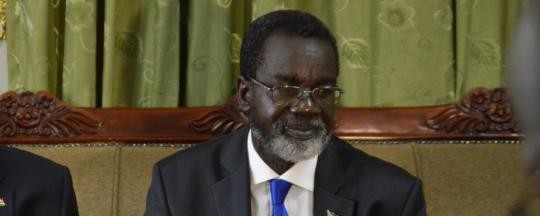The South Sudanese government has denied reports that it ever had rejected the involvement of the ‘Troika’ countries of Norway, USA and the UK in mediating negotiations to end South Sudan’s civil war.
In March, the Minister of Information and Broadcasting Michael Makuei Lueth said the government does not want the so-called ‘Troika’ to be included in the mediation team for new peace talks.
“Our position is that… the coming ‘IGAD-plus’ should be IGAD plus African countries. From the four sides of southern Africa, eastern Africa, north Africa and west Africa. This is what we know. But anything that brings Troika – Troika are not Africans,” he said.
Deputy Foreign Minister Bashir Gbandi today said South Sudan is part of the regional and international community and they are proud of the contributions of the international community for the sake of independence and development.
“We are now a nation a result of assistance from the international community,” said.
Speaking at a press conference on Thursday, Deputy Foreign Minister Bashir Gbandi said: “We didn’t request the exclusion of Troika from the next round of talks with the rebels.”
He confirmed that the last round of talks did not fail because they wanted to reach a comprehensive agreement that will meet the aspirations of citizens. “So setting a deadline for signing a peace agreement would not serve the national interest, we want sustainable peace,” he explained.
Gbandi confirmed his government’s commitment to bring about peace in South Sudan. The government delegation for the peace talks has received strict instructions from President Kiir to be ready to go to the negotiations at any time, according to the South Sudanese diplomat.
Bashir Gbandi, who is also member of the negotiating team, asserted that the negotiating delegation is ready to reach a good agreement in the near future. Meanwhile, Foreign Minister Barnaba Marial Benjamin said the sanctions that will be imposed on South Sudan target government officials only.
He stressed that the government strongly rejects them because they don’t help bring about peace in South Sudan. Marial further said the imposition of sanctions doesn’t mean that the diplomatic relations between Juba and the United States are bad.
“We will continue discussing with them all the issues facing South Sudan, and we want them to be fair with us. Yes, we have disagreements with our partners, but it does not mean that we have failed,” he explained.
Meeting on South Sudan
Separately, Sudan’s Presidential Assistant Ibrahim Ghandour met the Royal Norwegian Ambassador in Khartoum Morten von Hanno on Thursday.
The meeting discussed bilateral relations between the two countries and the push for the National Dialogue as well as the ongoing conflict in South Sudan.
In his remarks after the meeting, Ambassador Hanno said their meeting with Ghandour focused on the Sudanese national dialogue and the situation in South Sudan.
Norway believes that Sudan could pay a big role in assisting the warring parties in South Sudan to sign an agreement to end the suffering of civilians, the Norwegian diplomat reportedly said.



